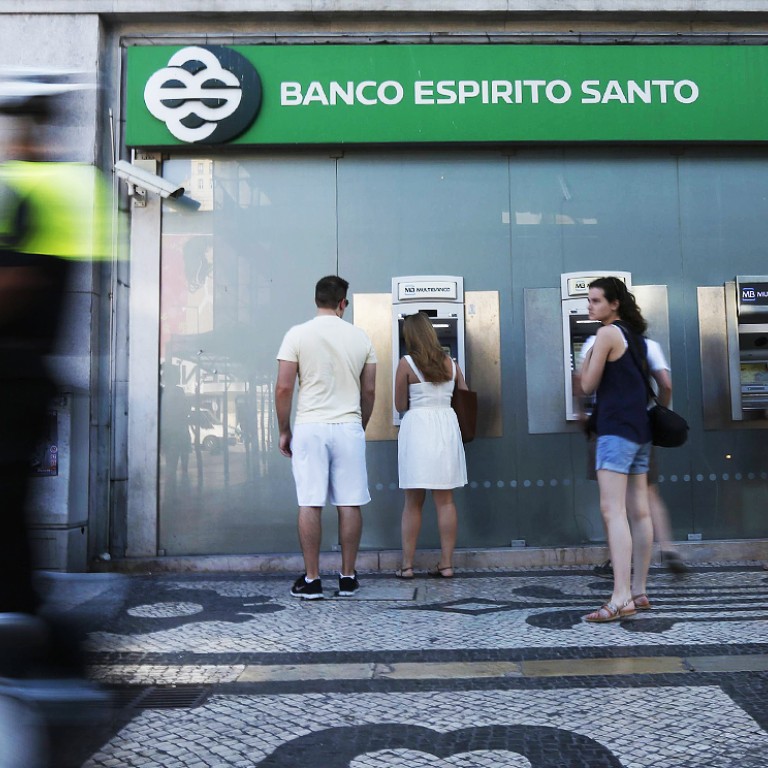
Banco Espirito Santo may need bail-in as agencies slash credit ratings
Portugal's largest listed bank is feeling pressure from parent's financial irregularities, but its resolution could bring other benefits to economy
Banco Espirito Santo's woes may not reignite the euro crisis but could give useful information about who will pay the inevitable costs.
Under pressure after the discovery of financial irregularities at its family-controlled parent, BES is a potential test case of the euro zone's commitment to punishing bad decisions and rewarding good ones.
The long-term rewards could be considerable but they would come at a short-term cost, especially for investors.
At issue is who will foot the bill for any shortfall if losses accruing to BES swamp its capital. While BES, Portugal's largest listed bank, said last week that it had €2.1 billion (HK$22.2 billion) in capital above regulatory minimums, against only €1.15 billion in exposure to the Espirito Santo family empire, Moody's and Standard & Poor's both slashed its credit ratings further into junk territory.
One surprising aspect of the ratings agencies' judgment was that both held BES's senior debt rating to be better than that of its parent, the reverse of the norm. Both agencies explicitly cited the possibility that Portugal might support the bank, potentially bailing out both it and its creditors.
Thankfully Pedro Passos Coelho, Portugal's prime minister, appeared to rule out a moral-hazard-inducing bailout.
"Private businesses have to suffer the consequences of the bad deals they make. Taxpayers will not be asked to bear the losses of private companies," Passos Coelho said.
That was heard in the bond market, causing Portugal's debt to rally and yields on a BES junior bond to spike to above 10 per cent. While it is impossible to know if or to what extent the bank might need support, those price movements reflect a belief that creditors to the bank would be bailed in, if necessary.
A bail-in, really nothing more than allocating losses to creditors depending on where they sit in a firm's capital structure, is a concept that, while enshrined in an EU directive covering bank resolution set to come into force next year, has often been avoided during the long global banking crisis, either out of political or operational expediency. Its flip side, of course, is the bailout, in which creditors and sometimes equity holders are shielded from losses by government money.
The 2013 resolution of the Cyprus banking crisis was a notable exception, with creditors including depositors sharing in the pain when its largest bank was restructured and its second-largest shut down. Cyprus was forced to put in place capital controls to stop depositor flight but the longer-term impact on bank funding elsewhere in the euro zone has been minimal.
All of this was bitterly resented by those affected but largely ignored by those not. This may be because Cyprus was both small and an utter mess, allowing investors to tell themselves that their holdings elsewhere in Europe would never face a similar situation.
A potential but real risk to a bail-in is that it spooks those who lend to banks, driving up the cost of bank fundraising and complicating efforts to shore up capital. That risk is not to be underrated. Europe's banks remain, on the whole, undercapitalised and are often opaque and difficult to analyse.
A funding spike after an exemplary bail-in, however, might end up being a short-term payment on some real long-term benefits.
As a bail-out in Portugal would be hugely unpopular elsewhere in the euro zone, if Portugal sticks to its principles it will go a long way to demonstrating that things can change and are changing. An allocation of losses based on law and contract would show capital markets are functioning, and that risk and reward (and loss) are properly related.
The resolution of BES, should it prove necessary, might bring other benefits. Guntram Wolff, a director at European think tank Breugel, argues it might lead to 'de-zombification' in Portugal. Zombie banks are those so impaired that their energies are used in keeping themselves upright rather than in playing their role within the economy.
National authorities often abet zombie banks as the easier course, but doing so can leave the rest of the economy without the credit it needs to recover.
Given the euro zone's dependence on bank financing rather than capital markets, this is no small issue. If zombie banks are allowed to fail, ultimately credit flows improve.
A bail-in may not be needed and would be painful, but if it is it should be welcomed.

